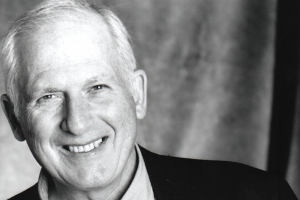
Allen Soroka attended law school at the University of Virginia, where he recalls that every second student was the son of a governor. He worked as a criminal defense lawyer for four years before relocating to New York and working at the Federal Reserve Bank. Wanting to raise a family, he took night classes at Columbia University to obtain a Master of Library Science degree, and subsequently relocated to Vancouver to take up a position in the Law Library at UBC in October of 1969.
He wore a suit and tie for the first six weeks upon his arrival, but no one would talk to him. So, he scrapped his outfit for a more accessible t-shirt and denim jeans. As a law librarian, he provided a range of reference assistance, legal research, and library instruction to generations of law students.
UBC Law was a very different place during Soroka’s time. At the time, there was no women’s washroom in the building and, as Soroka recalls, a sign hung in the Common Room, which read “No Women Allowed.” With the assistance of Cheryl Stephens, who he later married; and Lynn Smith, later to become the Dean of the faculty, Soroka organized a successful occupation of the faculty washroom. Subsequently, the administration finally capitulated and installed a women’s washroom.
In the 1970s, Soroka, nicknamed “Red Al,” became politically active both on and off-campus. Soroka’s name was frequently mentioned in the Ubyssey, and he was instrumental in organizing a protest against a South African MP to speak on campus. He was later disciplined by the President of UBC, Doug Kenney. This, in turn, led to a wave of protests outside the President’s door by a number of law students, all of whom supported Soroka’s cause.
While his leftist politics frequently brought him trouble, Soroka found a surprisingly receptive audience in George Curtis, Dean of UBC Law from 1945 to 1971. “I used to sell the Canadian People’s Daily News outside the liquor store,” Soroka recalls. “George used to buy it from me and the next day he’d ask me questions about it. He’d actually read it!”
Off-campus, Soroka ran as the Marxist-Leninist candidate for Richmond-South Delta in the 1979 Federal election and the People’s Front candidate for Vancouver-Point Grey in the 1986 Provincial election. Following his retirement in 2001, Soroka has taught a number of courses at UBC Law in an adjunct capacity, served as a hearing officer in the Recourse Branch of the Canada Public Service Commission. He is presently one of the legal members on the British Columbia Mental Health Review Board.
When asked by the UBC Law History Project where his politics came from, Soroka says that his views developed from looking at his new home country and its place in the world. “Canada was so integrated into the American war machine,” Soroka says. “The Marxist-Leninist party was the only one out there to aim for an independent, self-sustaining economy, free from American militarism.”
Politics aside, Soroka says that during his thirty-one years at UBC Law, “the professors were excellent,” noting in particular Leon Getz, Joe Smith, Jim MacIntyre, Dennis Pavlich and Steve Wexler.
Listen to Allard Law History Project Interview with Allen Soroka.
First published on January 26, 2024.